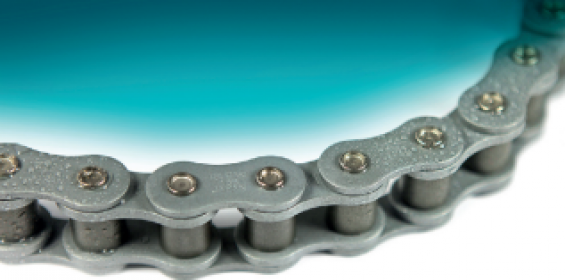Roller chain upgrade reduces costs for pizza manufacturer
Published: 07 April, 2022
Roller chains used to drive food packaging machines have to ensure stable motion. With produce destined for demanding supermarkets, conveyors driven by roller chains must maintain the quality of packaged produce, as well as high throughput. PWE reports.
A French food manufacturer turned to Tsubaki to provide a roller chain that would not just reduce maintenance requirements and replacement costs, but also contribute to increased productivity.
At a pizza manufacturer in France, a roller chain is integral to drive the plant’s conveyor that moves packaged product to a final chilled storage area, ready for onward distribution. With the majority of product shipped to supermarkets, profit margins are tight. This means that, in addition to ensuring quality, the pizza manufacturer has to maximise productivity and make sure that production targets are achieved. The conveyor’s chain is vital to ensuring that product is quickly and efficiently transported to despatch without damaging either the packaging or the pizzas. Every three days, the maintenance team had to check the chain for elongation. While this important maintenance forces a halt in the production process, the consequences of chain elongation include uneven conveyor motion as well as an increased risk of breakdown. Vibration and slippage of the conveyor can damage the product, as well as causing uneven alignment and disruption to the subsequent packaging process. More seriously, machine breakdown caused by chain failure can result in lengthy downtime.
Despite maintenance and adjustment, including regular lubrication, the chain had to be replaced every three months. After this situation had endured for 15 years, operations management ultimately calculated that investing in a premium quality roller chain would offset the cost, maintenance and downtime of frequently replacing a lower quality chain. The trial of a premium quality roller chain resulted in increased productivity and a reduction in the total cost of ownership. As a result, the team selected Tsubaki’s GT4 Winner roller chain for the replacement.
Tsubakimoto Europe’s Sales & Marketing Director, Jake Yamamoto, commented: “Tsubaki’s chains have a wide range of sizes and configurations, so it simply meant a direct replacement to prove the concept of significantly reduced elongation and increased chain life.” He added that the chain’s are qualified with a highly robust test process, and demonstrated that ultimately, the investment reduced the total cost of ownership and most significantly, helped to increase the pizza manufacturer’s productivity.
A key attribute in reducing elongation is Tsubaki’s patented Ring Coining design. Applying a cold deformation process around the pin hole of the connecting link plate adds strength and reinforces the chain immediately surrounding the pin. Reinforcing this typical stress area allows the chain to be specified to its full kW rating and significantly decreases the effects of elongation.
In combination, Tsubaki’s Lube Groove system enables more effective lubrication, both decreasing maintenance requirements and increasing chain life. The specially designed lube grooves mean that lubrication is retained between the pin and the bush, the point of highest contact and friction, instead of dispersing. This feature minimised chain wear and elongation over time.
Following installation, the Tsubaki GT4 Winner far exceeded the three months lifetime of the previous chain and only required its first adjustment after 18 months’ use. The longer life of the new chain resulted in a new challenge that the production facility’s maintenance engineers hadn’t previously encountered with the former roller chain: humidity. The original chains didn’t last long enough to be susceptible to corrosion, so Tsubaki suggested using the Neptune chain instead to further prolong life in humid conditions.
With a special coating and resin, the Tsubaki Neptune is tested to withstand 700 hours of saline spray and remain corrosion free. The chain retains the same tensile strength and resistance to elongation as the GT4 Winner, thanks to its carbon-steel base. The Neptune’s anti-corrosion treatment doesn’t impact its strength or durability in any way, unlike some rust-prohibiting coatings.
Yamamoto added: “Now with the Tsubaki Neptune, the original chain is still running and, following its first upcoming adjustment at 18 months, the chain will provide the plant with many additional months of service. “The pizza manufacturer’s maintenance and operations teams are convinced that the initial investment in a precision engineered roller chain certainly provided economic pay-back as well as reducing their maintenance requirements and overall budget.”
https://www.linkedin.com/company/tsubakimoto-europe-b.v./







